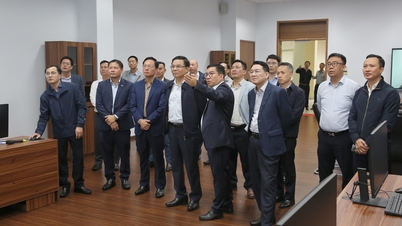Vietnam is strongly transforming itself into a digital economy , digital data and a management model that applies digital technology extensively. The speed of technology application in production - business, public services, finance - banking, healthcare, education, etc. has far exceeded previous imaginations. Meanwhile, the legal system, which is the "rail" for running the country, is under great pressure: the volume of documents is increasingly massive, the speed of issuance is fast, the scope of regulation is intertwined and more complex than ever.
The mismatch between the pace of practice and the traditional way of "lawmaking" has created many bottlenecks. Overlapping, contradictions, lack of unity, and lack of guiding documents continue to be among the biggest challenges facing the legal environment. This has led to many consequences: increased compliance costs, reduced business confidence, weakened forecasting capacity, and efforts to reform institutions have difficulty achieving the desired results.
Looking at reality, it can be seen that amending each law and each provision in the traditional way only solves the problem at the surface. The root cause lies in the thinking model. When the law has become a complex, interdisciplinary, and rapidly changing system, the approach of “drafting legal documents” is no longer enough. Vietnam needs to shift to the thinking of “designing and managing the legal system” - a strategic, systematic, and evidence-based thinking based on the deep application of data science .
However, transforming legislative thinking cannot stop at technology alone. More importantly, it is about changing the way work is organized, the analytical model, the inter-sectoral coordination mechanism and the skills of the policy-making team. A digital legal system requires good data, clear rules, standardized processes and unified technical standards. This requires the early development of a national strategy on digital transformation in law-making.
Along with that, Vietnam needs to establish a mechanism to regularly monitor, review and evaluate laws after they are issued, which for many years has been a “weak link” in the policy cycle. When there is data, technology will help the review become more proactive, accurate and scientifically based. This is the way to ensure that the legal system is not only issued correctly but also operated correctly.
In addition to “internal” reforms, a modern legal system must also ensure the ability to interact with citizens and businesses. The application of technology in receiving, analyzing and responding to citizens’ petitions not only improves enforcement efficiency but also strengthens the trust and accountability of the state. In many countries, digital platforms help citizens track the progress of petition resolution and easily look up laws, thereby reducing compliance costs and increasing accessibility.
Clearly, innovation in the way of thinking about law-making in the digital age is not just an option, but an inevitable requirement for Vietnam to move forward on the path of rapid, sustainable and self-reliant development. And as many experts and National Assembly members believe: if we consider law as the key driving force of innovation, then it is time for us to have a “revolution” in the way of designing and managing the legal system, a revolution led by data, technology and modern thinking.
Source: https://daibieunhandan.vn/doi-moi-tu-duy-xay-dung-phap-luat-trong-ky-nguyen-so-10396744.html









































































































Comment (0)